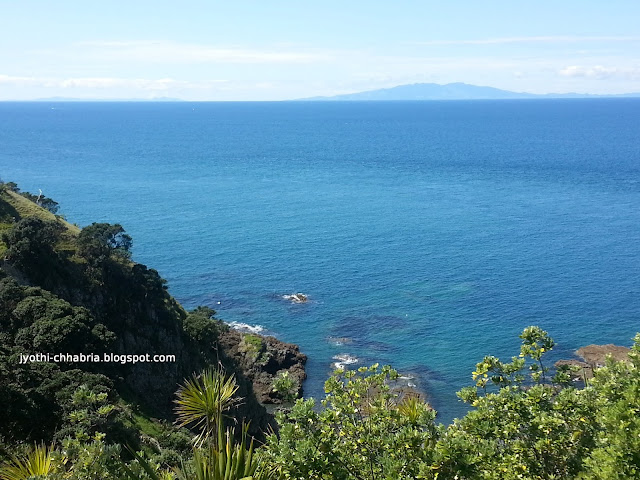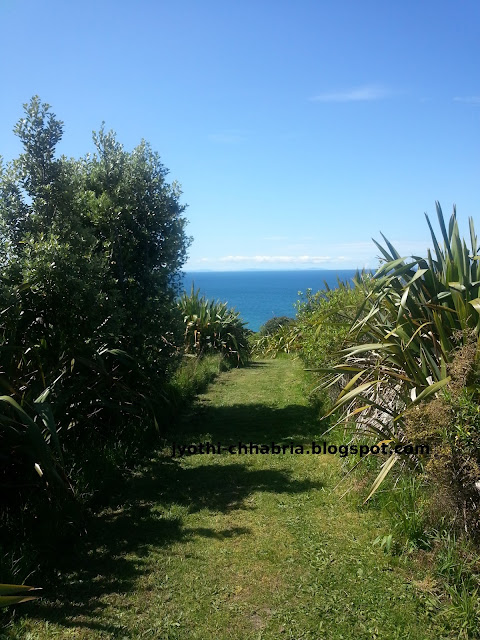The island is a pest free scientific reserve and is home to many native
species of flora and fauna as well as birds. It is one of the most successful conservation projects in the world and is also referred to as the "Treasure Island".
Time to get there :
A little over an hour by ferry - Fuller's 360 Discovery
The ferry starts at 9am and returns at 3:30pm on the same day. There is an option to stay the night, which will require a booking at the bunkhouse.
Cost :
70 NZD for return fare for a person on the ferry plus extra for coffee and snacks. Add on the cost for lunch. We carried a home cooked meal.
What to wear :
Comfortable clothes depending on the weather. Layer up would be my recommendation. It gets a bit cold on the ferry and when exposed to the sea at the beach in winter/spring.
Sturdy, comfortable walking shoes - can get slushy in some parts especially if after a rain.
Things to carry :
* Sufficient Drinking Water - there is water available at the store
* Lunch - packed in a sealed container - to deter rodents and other pests
* Snacks
* Garbage bag - you must carry away all your rubbish
* A rain jacket
* Sun hat
* Sunscreen
* Good camera
* Binoculars
* Sunglasses
If staying overnight, ensure to pack more food.
Things to do :
The walks are suitable for all kinds of walkers and are not strenuous. There are parts which have a few steps but you can always do it at your own pace. There are numerous spots to have a wee bit of relaxation and watch the birds enjoy the birdbaths in place. There are a multitude of short walks which can be connected together to make a longer walk.
This link mentions all the walks.
Since the island is pest free, you must ensure that all your gear is free of rodents and other pests. Brushes are provided before getting onto the ferry as well as at the concrete landing to free any lose particles on shoes.
Do try to avoid dropping food and doing your best to pick up what does fall.
History :
Originally cleared for farming, the island was known for the light house, Tiritiri light. As years progressed, a foghorn was installed. After more than a decade, the pastoral land has been eradicated of all pests and native trees were replanted. This helped reintroduce native species too.
Time to get there :
A little over an hour by ferry - Fuller's 360 Discovery
The ferry starts at 9am and returns at 3:30pm on the same day. There is an option to stay the night, which will require a booking at the bunkhouse.
Cost :
70 NZD for return fare for a person on the ferry plus extra for coffee and snacks. Add on the cost for lunch. We carried a home cooked meal.
What to wear :
Comfortable clothes depending on the weather. Layer up would be my recommendation. It gets a bit cold on the ferry and when exposed to the sea at the beach in winter/spring.
Sturdy, comfortable walking shoes - can get slushy in some parts especially if after a rain.
Things to carry :
* Sufficient Drinking Water - there is water available at the store
* Lunch - packed in a sealed container - to deter rodents and other pests
* Snacks
* Garbage bag - you must carry away all your rubbish
* A rain jacket
* Sun hat
* Sunscreen
* Good camera
* Binoculars
* Sunglasses
If staying overnight, ensure to pack more food.
Things to do :
- Walking
The walks are suitable for all kinds of walkers and are not strenuous. There are parts which have a few steps but you can always do it at your own pace. There are numerous spots to have a wee bit of relaxation and watch the birds enjoy the birdbaths in place. There are a multitude of short walks which can be connected together to make a longer walk.
This link mentions all the walks.
- Wattle Track - Wharf to Lighthouse - under 30 minutes. There is an option to do this on the road
- Hobbs Beach Track - Wharf to Hobbs beach - under 10 minutes. Take in the beautiful views of Rangitoto and Auckland. Don't miss the penguin nesting boxes on the left hand side
 | ||||||||||
| View of Rangitoto Island from Hobb's Beach |
- Kawerau Track - Hobb's Beach to Ridge Track - under 40 minutes. A scenic walk with loads of opportunities to view some birds like saddleback, tui, wood pigeons, rifleman
- Ridge road/track - connects from Kawerau track to the lighthouse - under 30 minutes. Most of this is on gravel road.
- East Coast Track - about 90 minutes. This is a very scenic track with a few steep sections.
- Wattle Track - Lighthouse - Wattle Track loop track - about 1 hour
- Hobbs Beach Track - Kawerau Track - Ridge Track - Wattle Track - loop track - about 3 hours
- Kayaking
- Diving and Snorkelling
- Bird watching
- Relax on beach/Swimming
- Shop at the store
- Enjoy a free tea/coffee
Since the island is pest free, you must ensure that all your gear is free of rodents and other pests. Brushes are provided before getting onto the ferry as well as at the concrete landing to free any lose particles on shoes.
Do try to avoid dropping food and doing your best to pick up what does fall.
History :
Originally cleared for farming, the island was known for the light house, Tiritiri light. As years progressed, a foghorn was installed. After more than a decade, the pastoral land has been eradicated of all pests and native trees were replanted. This helped reintroduce native species too.
 |
| View from the East Coast Track |
 |
| Lighthouse area |
 |
| Another view from East Coast Track |
 |
| View of Rangitoto Island |
 |
| View of Rangitoto Island from Hobb's Beach |
 |
| Crystal clear calm waters |
 |
| When the clouds imitated the macrocarpa tree |

